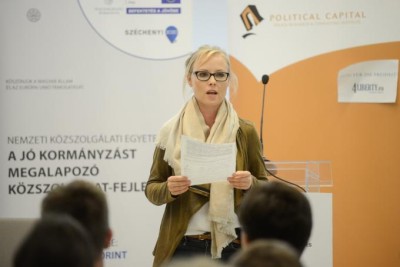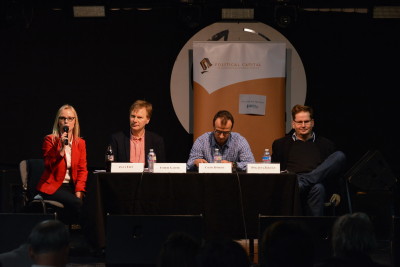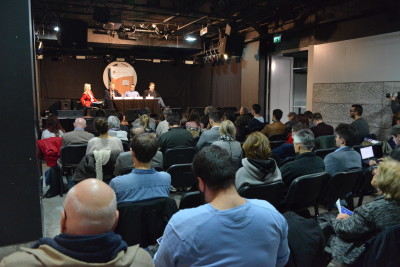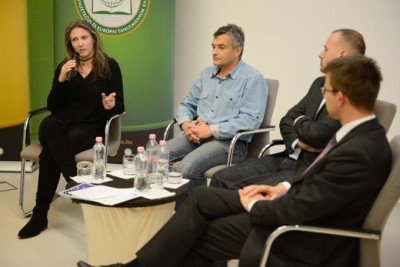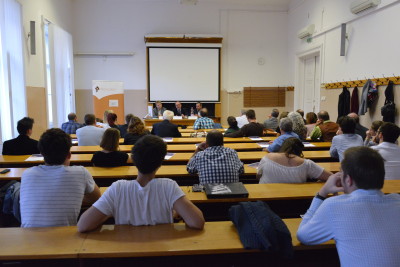Download full Policy Paper: 4liberty_ttip_a4_web
While CETA and TTIP have recently been dominating the Western media, it seems that there is a considerable lack of interest in the projects in the CEE region. Taking into account the fact that compared to Western countries such as Austria or Germany, the Transatlantic Trade and Investment Partnership enjoys much bigger public support in the Visegrad Group, it is very telling that there has only been a few cover stories on the topic in the Hungarian media, for example. One could assume that this is because people here are not familiar with TTIP as such and they identify it with prosperity and the West However, the the situation is more complex.
The views of civic and political actors in the Visegrád countries on TTIP were analyzed by Political Capital. Based on the surveys conducted by the European Commission on public opinion on TTIP, we describe how TTIP’s support changed between November 2014 and May 2016 in Hungary, Slovakia, Czech Republic and Poland. In May 2016, the majority of Europeans (51%) supported TTIP, while the share of opponents was 34%. Among the Visegrád Group, Polish society is the most supportive of TTIP – six out of ten people support it and only 23% are against the partnership. Among the Czechs and Hungarians the advantage of supporters is more moderate than that, but still over the EU average. The Slovakians are the most divided on the issue – 39% are opposed to the agreement, which is only slightly less than the size of the supporting camp (47%).
While public opinion in the Visegrád countries is supportive towards a free trade agreement between the U.S. and the EU, the governmental actors and the media are rather cautious about the issue, especially in Hungary and Poland. The political elite’s officially pro-TTIP side seems to generally be more silent than the anti-TTIP group. Firm criticism of TTIP coming from leftist and environmentalist forces on the one hand and right-wing players on the other hand overlap in certain aspects (the basis of criticism is globalization, critical attitude towards multinational companies, the impact of the U.S. in Europe and health and safety issues, GMO-free status, concerns over national sovereignty).
Lack of interest in Hungary is partly the result of the fact that the government’s and the governing party’s position towards TTIP is rather ambivalent: while at the level of official and international policy statements and actions the government is rather supportive, at the level of political declarations it has often been discouraging – not to mention the fact that there are openly different opinions within the government (János Lázár, Minister for the Prime Minister’s Office has signed a Stop-TTIP petition, while the government officially supports the negotiations). Among Hungarian opposition parties, LMP and Jobbik (and less visibly PM) firmly oppose TTIP. While MSZP cautiously, DK, Együtt and the Liberals firmly support TTIP. Hungarian public debate is certainly asymmetric in a sense that the pro-TTIP argument is much weaker than the anti-TTIP side on the rhetoric level.
Among the governments of the Visegrád Group, the most criticism was directed at the details of TTIP negotiations by the Hungarian and Polish ones. The two states raised concerns about the Investor State Dispute Settlement (ISDS) mechanism and GMOs. The Polish side was also worried about food safety, while the Hungarians insisted that the agreement must be ratified by nation states. The approach of the Czech government towards TTIP is rather positive, but, according to the government’s statements, the Czechs will not sign a ‘blank check’. In terms of rhetoric, the Slovak government has recently been the most positive about TTIP. One of the main differences between the Hungarian government and the other members of the Visegrád group was that the Hungarians did not urge the swift conclusion of negotiations.
By analyzing the Eurobarometer surveys, we have identified the most significant factors that are relevant to public opinion on TTIP. Those who place themselves politically in the right wing are more supportive of TTIP than those on the left. Within the V4, this trend is, however, less pronounced, with only the Czechs showing significant correlation. Self-identified right-wingers in the Czech republic support TTIP (67% for, 25%), while most of those who identify themselves as left-wing voters are against the treaty. Their share is 45%, while that of the supporters is 39%.
The more informed Europeans are as far as the EU matters are concerned, the more they support TTIP. However, the share of opponents is also higher in this group. In the V4, there is a higher proportion of supporters and less opponents than the average among the most informed. In Poland and Hungary, those for TTIP are in the relative majority even among the least informed. In Slovakia and the Czech Republic, those who could only give a correct answer to one of the questions on the EU they were asked, are either divided on the issue or they oppose TTIP to a small degree.
Trust in the European Union is strongly correlated with the support of TTIP. Those Europeans who rather trust the EU, in general support the planned agreement between the EU and the U.S. The distrustful are quite divided on TTIP. This phenomenon is more pronounced in the V4. In all four member states, at least seven out of ten who trust the EU support the planned partnership. The share of those against TTIP is relatively low, between 16 and 23%. Since trust within Europe has been dropping since 2014, the size of the pro-TTIP camp has also decreased in every survey since the autumn of 2014, whereas the share of opponents increased steadily.
Those who believe that things in the Union are currently heading in the right direction are generally supportive of TTIP. People optimistic about the European Union’s future are also mostly supportive of the partnership, while the pessimists are generally divided. In the Visegrád countries, people optimistic about the EU’s future also support TTIP. Among those who are pessimistic about the future we find more opponents than supporters, except for Poland. Europeans who feel positively about free trade are significantly more pro-TTIP than those who feel negatively about the concept. Similar results can be measured for globalisation.
When it comes to Hungary, on the basis of the discussions we previously organized with representative Hungarian political and economic opinion leaders and decision-makers, we have discovered that most of them are cautious about TTIP – even those who are basically supportive of free trade and increasing the intensity of transatlantic trade. Their main concerns were whether the EU could keep its current food safety standards on the current level, the transparency of the negotiations, the raison d’etre of the ISDS, the competitiveness of Hungarian SME’s and whether it is possible to have a TTIP-light at the end of the negotiation process. Respondents often had completely contradictory views, which is partly the consequence of the lack of relevant knowledge on TTIP and partly the result of the divisiveness of the topic domestically. According to our background discussions, some of the Hungarian opinion leaders and decision-makers only have a superficial knowledge of TTIP, therefore vague impressions and myths about TTIP are still dominant. However, we have also talked to very well-prepared participants.
Considering all the facts mentioned above, EU institutions and pro-TTIP organizations should make greater effort to make the details of TTIP-negotiations more visible to the public and inform the society more efficiently. Since trust in the Union is strongly correlated to the support of TTIP, and Euroscepticism is on the rise due to the multiple crises the EU currently faces, more public debate will be also needed in the future to discuss the advantages and disadvantages of TTIP-like trade agreements.




